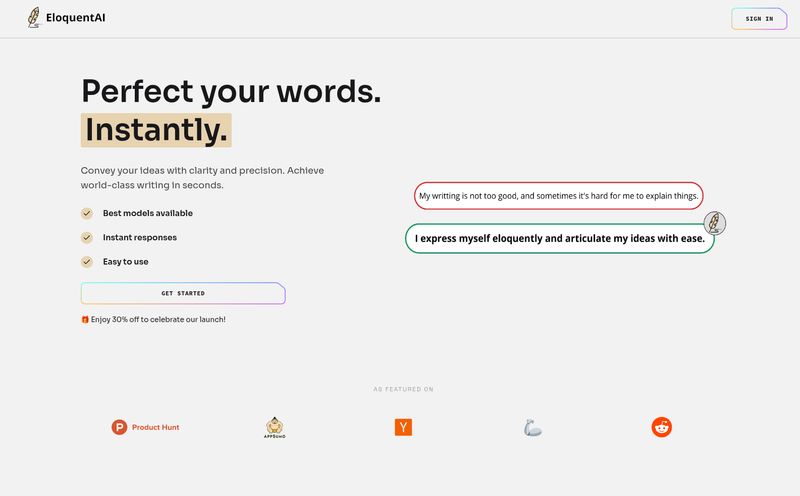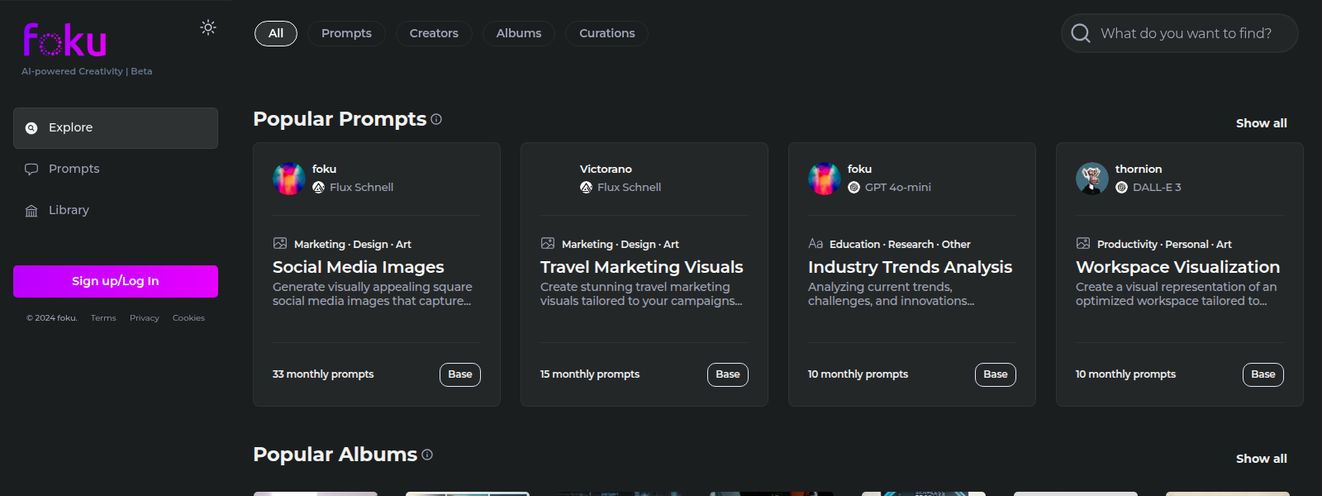I’ve been in the SEO and traffic generation game for what feels like a lifetime. I've seen tools launch with huge fanfare only to fizzle out, and I've seen quiet, unassuming platforms become absolute mainstays in my toolkit. So, when I stumbled across UnlimitedGPT, my curiosity was definitely piqued. The promise? All the power of ChatGPT, completely free, with zero registration required. Sounds almost too good to be true, right?
In our world, the phrase “too good to be true” usually comes with a massive, blinking, neon-red asterisk. We're all drowning in sign-up forms. Every new service wants our email, our phone number, a blood oath... okay, maybe not the last one. But the friction is real. The idea of just… using a powerful AI without handing over my digital identity is incredibly appealing. So, I decided to put on my skeptic's hat, pop the hood, and see what UnlimitedGPT is really all about.
What on Earth Is UnlimitedGPT Anyway?
Let's get the techy part out of the way first, but I'll make it quick. UnlimitedGPT isn't a new AI model built from scratch. It’s a proxy. Think of it like this: you want to borrow a book from a fancy, members-only library (that's ChatGPT). Instead of getting your own library card, you give your book request to a friend who already has a membership. Your friend goes in, gets the book, and brings it back to you. That's what a proxy does. It takes your request (your prompt), sends it to OpenAI's servers through its own account, and then passes the answer back to you.
The end result is that you get to chat with the AI without OpenAI ever knowing who you are directly. You’re effectively borrowing someone else's access. The whole platform is built around this one simple, powerful idea: giving you a free, anonymous-feeling front door to one of the most popular AIs on the planet.

Visit UnlimitedGPT
The Seductive Pull of 'Free' and 'No Login'
The main advantages here are pretty obvious, but they're worth talking about because they hit on major pain points for a lot of people. The first is, of course, that it's free. You dont have to worry about monthly subscriptions or token limits. It's a playground where you can experiment without watching a meter tick up.
But for me, the bigger deal is the no registration policy. I value my privacy, and I have a deep-seated fatigue from creating new accounts for every little thing. With UnlimitedGPT, you just go to the site and start typing. That's it. This is fantastic for:
- Quick, one-off questions: Need a quick recipe substitute or a clever way to phrase an email? You can be in and out in 30 seconds.
- Brainstorming sessions: When you just want to throw spaghetti at the wall and see what sticks without any commitment.
- Testing the waters: If you have friends or colleagues who are curious about AI but hesitant to sign up for anything, this is a frictionless way for them to try it.
The interface is as simple as it gets. It's basically just a chat window. No clutter, no complicated menus, no feature bloat. It's refreshingly straightforward.
Okay, But Let's Talk About the Catch (There's Always a Catch)
Alright, let's get real. Offering a service like this isn't without its own set of compromises. It's not magic; it's a technical workaround, and workarounds have weak points. I see two major areas you absolutely need to be aware of before you start pasting your life's work into this thing.
The Proxy Problem: Speed and Stability
Because you're routing your request through a middleman, the performance is entirely dependent on that middleman's servers. This means the speed and reliability can be a bit of a rollercoaster. One minute it might be lightning-fast, the next it could be sluggish or time out completely. It's like using public Wi-Fi at a busy café; it's super convenient, but you wouldn't rely on it for a mission-critical video call with a client. If the proxy server gets overloaded with users or has technical issues, your connection to ChatGPT suffers. It's a trade-off: you're trading the rock-solid reliability of a direct subscription for the convenience of free access.
The Giant Question Mark Over Security and Privacy
This is the big one. The one that should make you pause. When you use UnlimitedGPT, you are sending your prompts—your questions, your ideas, your data—to an unknown third-party server. They claim anonymity, but there's very little information about who runs the service or what their data handling practices are.
You have to operate under the assumption that anything you type could be logged, stored, or read. It's the digital equivalent of having a conversation in a crowded room—you just don't know who might be listening.
So, let me be crystal clear: do not use UnlimitedGPT for anything sensitive. Don't paste in proprietary business information, client data, personal financial details, secret love poems, or your master plan for world domination. Seriously. Think of it as a tool for public-domain-level information only. For anything private, you should always go directly to a service with a clear and trustworthy privacy policy, like OpenAI's official platform.
So Who Is This Tool Actually For?
After playing around with it, I've got a pretty good idea of the ideal user. UnlimitedGPT is perfect for the casual user, the student, and the curious hobbyist. It's for people who need quick, non-sensitive assistance.
- Students: Getting help summarizing a complex topic or brainstorming ideas for an essay.
- Writers and Marketers: Coming up with blog post titles, social media captions, or rewriting a clunky sentence.
- Hobbyist Coders: Asking for help debugging a small snippet of code or explaining a programming concept.
- The AI-Curious: Anyone who just wants to see what the fuss is all about without commitment.
Who is it not for? Professionals who need a reliable, secure tool for their daily workflow. Businesses handling sensitive information. Power users who need consistent access to the very latest models and features. If you fall into these categories, paying for a ChatGPT Plus subscription is a no-brainer.
How Does It Stack Up Against ChatGPT Directly?
Let's break it down in a simple table. Sometimes seeing it laid out like this makes the choice much clearer.
| Feature | UnlimitedGPT | Official ChatGPT (Free Tier) |
|---|---|---|
| Cost | Free | Free |
| Registration Needed | No | Yes (Email/Phone) |
| Speed & Reliability | Variable (Depends on proxy) | Generally Reliable |
| Privacy & Security | Unknown (Assume none for sensitive data) | Governed by OpenAI's Privacy Policy |
| Conversation History | No | Yes |
Frequently Asked Questions about UnlimitedGPT
- Is UnlimitedGPT really and truly free?
- Yes, as far as usage goes, it is completely free. There are no subscription fees or hidden charges to use the chat functionality. The 'cost' is paid in potential instability and privacy risks.
- Is it safe to use UnlimitedGPT for my work?
- I would strongly advise against it. Due to the unknown nature of the proxy and its data policies, you should never input confidential, proprietary, or personal information. Stick to public-knowledge queries.
- Do I need an OpenAI account to use it?
- Nope! That's the main selling point. You do not need to create an account with OpenAI or with UnlimitedGPT itself. You just visit the website and start chatting.
- Is UnlimitedGPT the same thing as ChatGPT?
- It's more accurate to say it gives you access to ChatGPT. The AI model answering your questions is from OpenAI, but you're communicating with it through a third-party service, not directly.
- Why is UnlimitedGPT so slow sometimes?
- The slowness is likely due to the proxy server being overloaded with traffic from many users at once, or it could be experiencing its own technical issues. Since you're sharing access, you're also sharing the bandwidth.
- Can I save my conversations?
- No, unlike the official ChatGPT interface, there is no feature to save your chat history. Once you close the browser window, your conversation is gone. It's designed for ephemeral, in-the-moment use.
My Final Take: A Handy Tool with a Big Asterisk
So, what's the final verdict? UnlimitedGPT is a genuinely useful tool for a specific type of user and a specific type of task. It successfully removes the friction of registration and payment, which is a breath of fresh air. It’s a fantastic, disposable tool for quick brainstorming and simple questions.
However, it comes with a massive caveat emptor—buyer beware. The privacy and security concerns are real and should not be ignored. My advice is simple: use it, enjoy it for the convenience it offers, but be smart. Treat it like a public computer at a library. It’s great for a quick search, but you wouldn't do your online banking on it. Keep your sensitive stuff safe and use the official channels for anything that truly matters.



